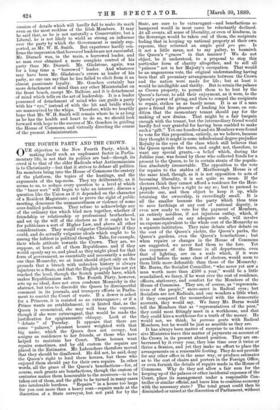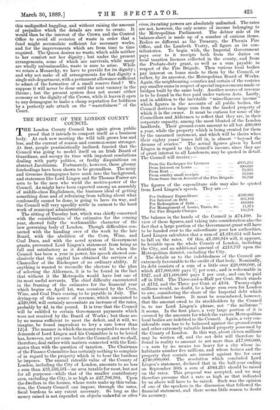THE FOURTH PARTY AND THE CROWN.
OUR objection to the New Fourth Party, which is making itself such an unpleasant factor in Parlia- mentary life, is not that its politics are bad—though its creed is to that of the elder Radicals what Antinomianism is to Christianity—but that it strives to debase all politics. Its members bring into the House of Commons the oratory of the platform, the topics of the hustings, and the arguments of the tap-room. They try deliberately, as it seems to us, to reduce every question to a level at which the " baser sort " will begin to take an interest ; discuss a question like the Union as if it depended on the character of a Resident Magistrate ; and to prove the right of public meeting, denounce the unmannerliness or violence of some over-bullied policeman. They refuse to acknowledge any of the ordinary ties which bind men together, whether of friendship or relationship or professional brotherhood, and set up the will of the electors as if it ought to be for politicians a sort of Higher Law, and above all other considerations. They would vulgarise Christianity if they -could, and do actually vulgarise ideals which ought to be among the loftiest in political thought. Take, for example, their whole attitude towards the Crown. They are, we suppose, at heart all of them Republicans, and if they would openly say so, and plead as they might plead for that form of government, as essentially and necessarily a nobler one than Monarchy, we at least should object only on the grounds that a breach with unbroken history is always injurious to a, State, and that the English people has not yet reached the level, though the Scotch possibly have, which makes Republicanism safe. The Fourth Party, however, sets up no ideal, does not even condemn Monarchy in the abstract, but tries to discredit the Queen by disrespectful comment in its journals, and trumpery efforts in Parlia- ment to convict the Court of waste. If a dower is asked for a Princess, it is resisted as an extravagance ; or if a Prince wants an establishment, it is hinted that, as the Queen is economical, she may well bear the expense, though if she were extravagant, that would be made the justification for epigrammatic obloquy. Look at the " debate " of Tuesday. It appears that there are some " palaces," pleasant houses weighted with that big name, which the Queen does not occupy, but assigns as residences to her friends, or those who have helped to maintain her Court. These houses want repairs sometimes, and by old custom the repairs are placed in the Estimates. Mr. Labouchere therefore moved that they should be disallowed. He did not, he said, deny the Queen's right to lend these houses, but those who enjoyed them should pay for their own repairs. In other words, all the grace of the Queen's benefactions—for, of course, such grants are benefactions, though the custom of centuries makes them honourable to the receivers—is to be taken out of them, and the gifts to be turned in many cases into intolerable burdens. " Repairs " in a house too large for you cost more than a heavy rent—repairs made at the discretion of a State surveyor, but not paid. for by the State, are sure to be extravagant—and benefactions so hampered would in most cases be reluctantly declined. At all events, all sense of liberality, or even of kindness, in the Sovereign would be taken out of them, the recipients feeling that in keeping up national property at their own expense, they returned an ample quid pro quo. Is it not a little mean, not to say paltry, to besmirch the Queen's " graces " in that manner ? We do not object, be it understood, to a proposal to stop this particular form of charity altogether, and to sell all " palaces " not in her Majesty's occupation. That would be an ungenerous vote, the original understanding having been that all pecuniary arrangements between the Crown and the nation were made for life ; but at least it would be intelligible and thrifty. But to retain the palaces as Crown property, to permit them to be lent by the Queen's favour, to add their enjoyment, as it were, to the Queen's power of giving, and then to compel the recipients to repair, strikes us as basely mean. It is as if a man gave a friend the pleasure of lending his house, on con- dition that the momentary tenant should pay for the making of new drains. That might be a fair bargain enough with the tenant, but the intermediary friend would hardly feel very grateful for having been enabled to make such a "gift." Yet one hundred and six Members were found to vote for this proposition, entirely, as we believe, because they thought it might in some infinitesimal degree prejudice Royalty in the eyes of the class which still believes that the Queen spends the taxes, and ought not, therefore, to want any special grants,—a belief which, during the Jubilee year, was found by those who collected funds for a present to the Queen, to be in certain strata of the popula- tion absolutely irremovable. The opposition to the vote for repairs to the stables of Marlborough House is of the same kind, though, as it is not opposition to acts of becoming liberality, it is not quite so mean. If the electors think they cannot afford a residence for the Heir- Apparent, they have a right to say so ; but to pretend to provide one, and then object to keep it up, while retaining the ownership, is exceedingly small. It is all the smaller because the party which thus tries to save farthings at any cost of national dignity, is even now ready to vote for the payment of Members, an entirely needless, if not injurious outlay, which, if it is sanctioned on any adequate scale, will involve an expense equivalent to the whole cost of the Monarchy as a separate institution. They raise debate after debate on the cost of the Queen's yachts, the Queen's parks, the Queen's gardens, even the Queen's benefactions ; but when repairs or changes in the House of Commons are suggested, we never find them to the fore. Yet the expenses of the House in all departments, even that of lighting, are on a scale which, if it were paraded before the same class of electors, would seem to them little more defensible than those of the Monarchy. Mr. Burns, the Socialist Councillor, " who never yet saw a man worth more than £500 a year," would be a little scandalised, we fancy, if he went over the cost of residence, officers, stationery, and comfort for the Members of the House of Commons. They are, of course, as "representa- tives of the people," sacro-sanct in Radical eyes ; but Socialists are not Radicals, and one wonders a little what, if they compared. the monarchical with the democratic accounts, they would say. We fancy Mr. Burns would tell the Members that as " representatives of the poor," they could most fittingly meet in a workhouse, and that they could hire a workhouse for a tenth of the money. He would not, we think, be persona grata with Radical Members, but he would be just as sensible as they are. It has always been matter of surprise to us that succes- sive Ministries leave this matter of payments on account of the Crown in its present absurd position. They are em- barrassed by it every year, they lose time over it twice or thrice a Session, and yet they make no effort to place the arrangements on a reasonable footing. They do not provide for any other office in the same way, or produce estimates as to the cost of chairs and porters in the Foreign Office, or even furnish the details of repairs made in the House of Commons. Why do they not allow a fair sum for the keeping up of the palaces or other incidental expenses of the Court, place its management under a responsible Con- troller or similar official, and leave him to combine economy with the necessary state ? The total grant could then be diminished or raised at the discretion of Parliament, without this undignified haggling, and without raising the amount of prejudice which the details are sure to create. It would then be the interest of the Crown and the Control Office to avoid all occasion of waste in order that a fund might accumulate sufficient for necessary works, and for the improvements which are from time to time required. The Queen desires no waste, which adds neither to her comfort nor her dignity ; but under the present arrangements, some of which are survivals, while many are wholly unbusinesslike, waste is sure to arise. While we retain a Monarchy, we have to provide for its dignity ; and why not make of all arrangements for that dignity a single sub-department, with a permanent allowance sufficient to admit of the formation of a small reserve fund ? We suppose it will never be done until the next vacancy in the throne ; but the present system does not secure either economy or the dignity of the Crown, while it leaves it open to any demagogue to make a cheap reputation for boldness by a perfectly safe attack on the " wastefulness " of the Court.



















































 Previous page
Previous page